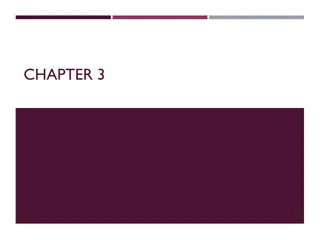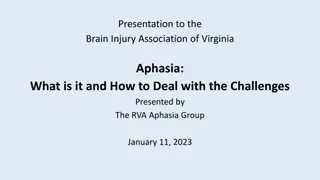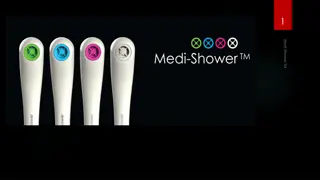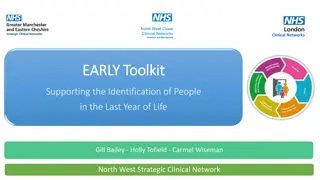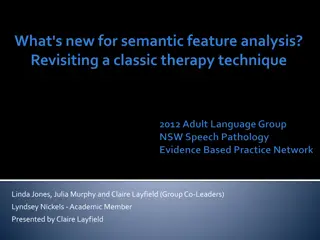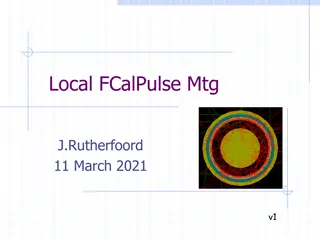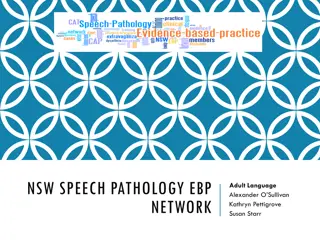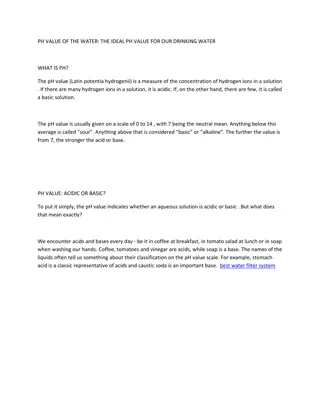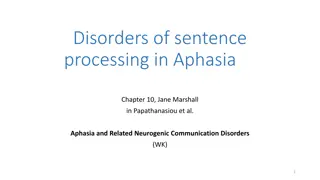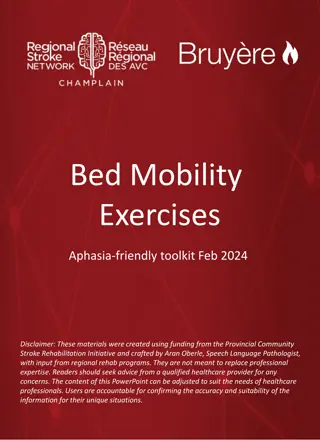Aphasia-Friendly Shower Protocol Toolkit
These materials provide a step-by-step guide for individuals with aphasia to safely use showers independently or with assistance. Created by a Speech Language Pathologist, the toolkit includes scheduling tips, safety precautions, and instructions for showering at the hospital. Users are advised to seek professional advice for personal concerns. The content is customizable for healthcare professionals' needs.
Download Presentation

Please find below an Image/Link to download the presentation.
The content on the website is provided AS IS for your information and personal use only. It may not be sold, licensed, or shared on other websites without obtaining consent from the author.If you encounter any issues during the download, it is possible that the publisher has removed the file from their server.
You are allowed to download the files provided on this website for personal or commercial use, subject to the condition that they are used lawfully. All files are the property of their respective owners.
The content on the website is provided AS IS for your information and personal use only. It may not be sold, licensed, or shared on other websites without obtaining consent from the author.
E N D
Presentation Transcript
Inflammatory Bowel Disease
Learning outcomes LO1: Introduction LO2: Occurrence & Commonness LO3: Pathophysiology LO4: Diagnosis (Symptoms and Signs) LO5: Complications LO6: Treatments (Medical and Surgical) 4/21/2025 2
LO1: Introduction: IBD: Chronic inflammatory diseases of GI tract of unknown etiology Commonly refers to 1) ulcerative colitis Ulcerative colitis (UC) affects only the large intestine. 2) Crohn s disease Crohn s disease (CD) can affect any part of the gastrointestinal tract but most frequently attacks the distal third of the small intestine & the colon. 4/21/2025 3
Other forms of IBD Collagenous colitis Lymphocytic colitis Ischemic colitis Behcet s syndrome Infective colitis Intermediate colitis 4/21/2025 4
Pathophysiology 4/21/2025 5
Environment UC: Common in non smoker and in ex smoker. CD: Common in smokers. Appendicetomy protects against UC. Diet : associated with low residue and high refined sugar diet Bacteria: Mycobacterium, listeria and endogenous bac. Virus: Measles
IBD Both UC and CD have waxing and waning in intensity and severity In most cases, symptoms correspond with degree of inflammation When patient is actively symptomatic, significant inflammation = flare-up of IBD When asymptomatic, inflammation absent (or less) = in remission 4/21/2025 8
http://t3.gstatic.com/images?q=tbn:5KL_Gud8Dc7wCM:http://factoidz.com/wp-content/themes/gabtheme/images/im-self-employed-do-i-really-need-to-have-health-insurance.jpghttp://t3.gstatic.com/images?q=tbn:5KL_Gud8Dc7wCM:http://factoidz.com/wp-content/themes/gabtheme/images/im-self-employed-do-i-really-need-to-have-health-insurance.jpg Clinical features Ulcerative colitis Diarrhea bloody-intermittent mild. do not seek medical attention. Rectal bleeding patient with Proctitis -pass fresh or blood stained mucus with formed or semi formed stool. Crampy abdominal pain Diarrhea
They also have tenesmus , urgency with feeling of incomplete evacuation. With proctosigmoiditis - constipation Severe disease-liquid stools with blood , pus & fecal matter.
Physical signs Proctitis Tender anal canal & blood on rectal examination Extensive disease-tenderness on palpation of colon. If perforation-signs of peritonitis
http://t3.gstatic.com/images?q=tbn:5KL_Gud8Dc7wCM:http://factoidz.com/wp-content/themes/gabtheme/images/im-self-employed-do-i-really-need-to-have-health-insurance.jpghttp://t3.gstatic.com/images?q=tbn:5KL_Gud8Dc7wCM:http://factoidz.com/wp-content/themes/gabtheme/images/im-self-employed-do-i-really-need-to-have-health-insurance.jpg Clinical features Ileal Crohn s Disease Abdominal pain Diarrhea Weight loss Low grade fever Jejunoileitis disease Malabsorption Steatorrhea
Colitis and perianal disease Bloody diarrhea Passage of mucus Lethargy Malaise Anorexia Weight loss
Extra-intestinal manifestations of IBD Arthritis: Peripheral arthritis, usually parallels the disease activity Ankylosing Spondylitis, 1-6%, sacroiliitis Ocular lesions: Iritis (uvietis) (0.5-3%), episcleritis, keratitis, Skin and oral cavity: Erythema nodosum 1-3% Pyoderma Gangrenosum 0.6% Aphthous, stomatitis.
Extra-intestinal manifestations of IBD Primary sclerosing cholangitis: occurs in 5% of patients with UC & may occur in Crohn's disease as well. These patients may have recurrent episodes of cholangitis as well as a malignant transformation to cholangiocarcinoma& a much higher than normal incidence of colorectal cancer. Therapy with ursodeoxycholic acid has been shown to be chemoprotective against colon cancer.
Differential diagnosis Anorexia nervosa Appendicitis Celiac sprue Clostridium difficile colitis Giardiasis Lactose intolerance Chronic pelvic pain Diverticulitis Pseudomembranous colitis Salmonellosis IBS (Irritable Bowel Syndrome) 4/21/2025 16
http://t0.gstatic.com/images?q=tbn:jfJE_24pXMP65M:http://www.lifescan.co.uk/Data/Resources/LifeScan/Segment_ParentsKids/GB/en/images/picture/2_4_diagnosis.jpghttp://t0.gstatic.com/images?q=tbn:jfJE_24pXMP65M:http://www.lifescan.co.uk/Data/Resources/LifeScan/Segment_ParentsKids/GB/en/images/picture/2_4_diagnosis.jpg Diagnosis UC Laboratory tests Endoscopy Radiography Biopsy http://t2.gstatic.com/images?q=tbn:teMqhVfKQLWJGM:http://www.chaturvedi.biz/products/sigmoidoscope.jpg
http://t0.gstatic.com/images?q=tbn:0mlkZkSLKInbDM:http://medicineandman.com/blog/wp-content/uploads/2008/08/blood-cells.jpghttp://t0.gstatic.com/images?q=tbn:0mlkZkSLKInbDM:http://medicineandman.com/blog/wp-content/uploads/2008/08/blood-cells.jpg Laboratory tests Hematological C-reactive protein is increased ESR is increased Platelet count-increased Hemoglobin-decreased Fecal calprotectin levels correlate with histological inflammation, predict relapses &detect pouchitis
Barium enema
Barium enema Fine mucosal granularity Superficial ulcers seen Collar button ulcers Pipe stem appearance- loss of haustrations Narrow & short colon- ribbon contour colon
Sigmoidoscopy Always abnormal Loss of vascular patterns Granularity Friability ulceration
http://t0.gstatic.com/images?q=tbn:jfJE_24pXMP65M:http://www.lifescan.co.uk/Data/Resources/LifeScan/Segment_ParentsKids/GB/en/images/picture/2_4_diagnosis.jpghttp://t0.gstatic.com/images?q=tbn:jfJE_24pXMP65M:http://www.lifescan.co.uk/Data/Resources/LifeScan/Segment_ParentsKids/GB/en/images/picture/2_4_diagnosis.jpg Diagnosis CD Laboratory tests Endoscopy Radiography Biopsy CT enterography http://t2.gstatic.com/images?q=tbn:Ad7CP5kTjaXWVM:http://www.drcrump.com/0598ce10.jpg
http://t0.gstatic.com/images?q=tbn:0mlkZkSLKInbDM:http://medicineandman.com/blog/wp-content/uploads/2008/08/blood-cells.jpghttp://t0.gstatic.com/images?q=tbn:0mlkZkSLKInbDM:http://medicineandman.com/blog/wp-content/uploads/2008/08/blood-cells.jpg Laboratory tests CRP-elevated ESR-elevated Anemia Leukocytosis hypoalbuminaemia
Barium enema String sign
Complications Toxic megacolon abdominal pain, distention Dilated colon allows bacteria to leak into bloodstream, increases risk of perforation and peritonitis If no improvement, usually treated with colectomy 4/21/2025 27
Strictures which can lead to obstruction Fistulas & abscesses (more common in CD, but also 20% UC) Fistula types: enterovesical, enteroenteric, enteromesenteric, enterocutaneous, rectovaginal & perianal In CD, obstructive hydronephrosis ( compressing rt. ureter) Sepsis, malnutrition in Crohn s 4/21/2025 28
Risk of Malignancy in IBD In Crohn s disease, increased risk of cancer of the affected areas (*) In ulcerative colitis, 8-10 years after initial diagnosis, there is a steady, significant increased risk of developing cancer Prognostic factors increasing malignancy risk in UC: Duration of disease 10 years or more Pancolonic involvement Continuous progressive disease Severe initial onset Associated liver disease 29
Treatment Diet change Lifestyle changes Surgery Drugs
Lifestyle changes http://t3.gstatic.com/images?q=tbn:H6bHZuJFk0CoxM:http://data1.blog.de/media/657/532657_7767ecd914_m.jpeg See full size image Taking rest No smoking http://t3.gstatic.com/images?q=tbn:yr2HO9JEyTpX-M:http://webpages.csus.edu/~dmo34/image3.jpg http://t2.gstatic.com/images?q=tbn:Z0xaMdOpoWBOtM:http://www.topnews.in/files/AmericaUnderStress222.jpg Stress reduction Doing exercise
http://t1.gstatic.com/images?q=tbn:mKsVCA7LJRqncM:http://www.babble.com/CS/blogs/strollerderby/2007/11/16-22/prescription-drugs.jpghttp://t1.gstatic.com/images?q=tbn:mKsVCA7LJRqncM:http://www.babble.com/CS/blogs/strollerderby/2007/11/16-22/prescription-drugs.jpg Drugs 5-ASA agents Glucocorticoids Antibiotics Immunosuppressant's Biological therapy
5-ASA Agents Sulfasalazine (5-aminosalicylic acid and sulfapyridine as carrier substance) Mesalazine (5-ASA), e.g. Asacol, Pentasa Balsalazide (prodrug of 5-ASA) Olsalazine (5-ASA dimer cleaves in colon) http://t2.gstatic.com/images?q=tbn:Ee8OBAeoDlIXEM:http://www2.prnewswire.com/mnr/pg/39814/images/39814-hi-Asacol_400mg.jpg
Topical Action of 5-ASA: Extent of Disease Impacts Formulation Choice Distribution of 5-ASA Preparations Oral Varies by agent: may be released in the distal/terminal ileum, or colon1 Liquid Enemas May reach the splenic flexure2-4 Do not frequently concentrate in the rectum3 Suppositories Reach the upper rectum2,5 (15-20 cm beyond the anal verge) 1. Sandborn WJ, et al. Aliment Pharmacol Ther. 2003;17:29-42; 2. Regueiro M, et al. Inflamm Bowel Dis. 2006;12:972 978; 3. Van Bodegraven AA, et al. Aliment Pharmacol Ther. 1996; 10:327-332; 4. Chapman NJ, et al. Mayo Clin Proc. 1992;62:245-248; 5. Williams CN, et al. Dig Dis Sci. 1987;32:71S-75S.
Antibiotics No role in active/quienscent UC Metronidazole is effective in active inflammatory,fistulous & perianal CD. Ciprofloxacin Rifaximin
Immunosuppresants Thiopurines Azathioprine 6-mercaptopurin Methotrexate Cyclosporine
Biological therapy Infliximab Anti TNF monoclonal antibody Infliximab binds to TNF trimers with high affinity, preventing cytokine from binding to its receptors It also binds to membrane-bound TNF- a and neutralizes its activity & also reduces serum TNF levels. Use Fistulizing CD Severe active CD Refractory/intolerant of steroids or immunosuppression Side effects Infusion reactions, Sepsis, Reactivation of Tb, Increased risk of Tb
Other medications Anti- diarrheals - Loperamide Laxatives - senna, bisacodyl Pain relievers. acetaminophen Iron supplements Nutrition
Surgery Ulcerative colitis Indications: Fulminating disease Chronic disease with anemia, frequent stools, urgency & tenesmus Steriod dependant disease Risk of neoplastic change Extraintestinal manifestations Severe hemorrhage or stenosis








